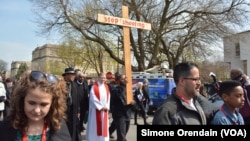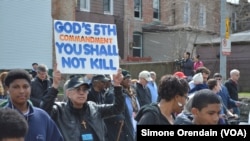A religious procession on Good Friday made its way through the Chicago neighborhood of Englewood, one of the most dangerous neighborhoods in the city.
Led by Roman Catholic Cardinal Blase Cupich from the Archdiocese of Chicago, the procession recreated the footsteps of Jesus as he walked the path that led to his crucifixion. The crowd marched for peace on the 20-block walk as they prayed, sang hymns and read from a list of 158 names of those killed, mostly in shootings, in the city since the beginning of the year.
“The presence of so many guns in society is something that cannot remain unchecked. We have to look for a way in which there is sensible gun policy,” Cupich said. “We also know that there’s a responsibility of young people, who turn to violence rather than ways in which they’re going to live productive lives, to make prudent decisions.”
Cupich said high-powered weapons need to stay off the streets and background checks for gun owners and sellers should be more thorough. His letter to church leaders in the archdiocese urging social action to counter gun violence brought participants from beyond city limits, out of state and leaders from other faiths.
Chicago leads US in homicides
Chicago led the United States last year with more than 760 homicides and 4,300 shootings. According to a study by New York University-based Brennan Center for Justice out in late December, the city skewed the country’s murder rate upward.
Last month, President Donald Trump met with the head of Chicago’s police union and questioned what was happening in the city, saying there was “no excuse” for the violence. He pledged support for officers, saying his administration formed an interagency task force to address violent crime. In January, the president, on the social media site Twitter, threatened to call in “the feds.”
Michael Le Chevallier, who participated in the march, said federal support from the president should be used for programs such as Crime Stoppers or a study that is looking at crime as a health issue.
“If he [Trump] wants to put federal funds toward that and if that’s what he’s saying when he says he wants to send the feds here, that would be great. If he wants to send some form of Untouchables, I think that’s encouraging more violence in our city,” Le Chevallier said.
Last month, U.S. Attorney General Jeff Sessions said more than $4 billion in funding for Justice Department programs would be held back should city and local governments act as “sanctuary cities” where local law enforcement handle illegal immigrants within their jurisdiction and do not always turn them over to immigration officials. Chicago has designated itself a sanctuary city.
How to involve feds
While discussion continues on the extent of federal involvement in addressing Chicago’s crime problem, march organizer the Rev. David Jones reiterated gun violence was not just a local issue, but something “all people of goodwill” should care about.
“We are joined by those who are right in these United States and those who are right in this world,” he said. “We are joined by those who walk by faith and not by sight and by people who walk with us despite having their very legs cut from beneath them.”
As the procession wound its way through the neighborhood, many Englewood residents welcomed the attention from Chicago faith leaders, saying it was badly needed.





